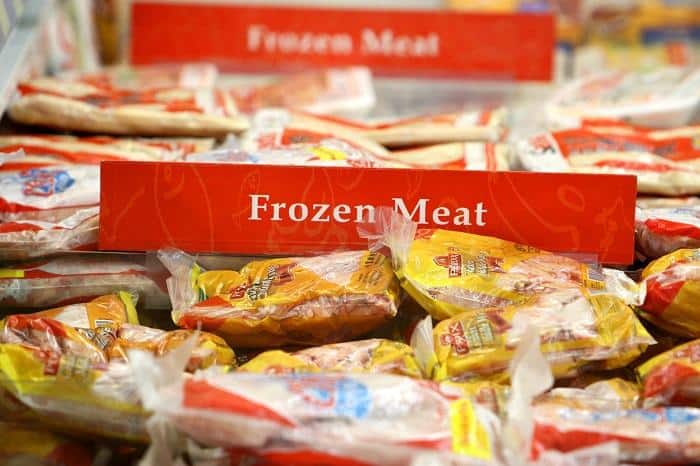Of all the different means we have at our disposal to preserve meats, the most common is freezing. In our modern society, we either cook our meat fresh or put it in the freezer until we are ready to use it. This makes sense in an industrialized society, where normal utility service can be counted on and the electricity only goes down when there is an emergency.
For those of us who are stockpiling food and preparing for the unknown, what’s considered “normal” isn’t our norm. The fact of the matter is that our electrical supply is very unreliable in times of crisis or disaster. Even a brief storm is often enough to blow power lines down. Something more serious, like a hurricane, can leave us without power for weeks.
Considering that a freezer can’t keep frozen meat frozen for more than two days without electricity, keeping more than three or four days worth of frozen meat on hand means that there’s a good chance you’ll lose it in a power outage. (Yes, there actually are survivalists who never freeze meat.)
The Easiest Way To Store A Month’s Worth Of Emergency Food!
The only way to prevent that meat from going bad in a survival situation would be to take it out of the freezer and preserve it by some alternate means. The big problem with that is that being thrown into a survival situation is going to overwhelm us — and we’ll likely have other, more urgent tasks. The last thing any of us will need at that moment is to have to deal with a freezer full of meat.
Alternate Means of Preserving Meat
What are some alternatives? I’d say that canned meats are safe. The canning process itself, if done properly, will ensure that the bacteria contained in the meat has died, making the meat safe for storage and eating. What about smoked meats? Most smoked meats are only cold-smoked for flavor, and not hot-smoked to keep for a prolonged period of time. Unless you’ve smoked it yourself and know that it was thoroughly hot-smoked, I wouldn’t count on it.
Commercially processed jerky isn’t even all that reliable. I’ve bought jerky at my local supermarket that has developed mold. That either means that the meat wasn’t properly marinated or that the salt concentration in the marinade was too low. If the salt concentration is high enough and the meat is properly marinated before dehydrating, there’s no way that it should go bad.
 The fact of the matter is that meats are the hardest thing to preserve, especially for long-term storage. Canning is the most reliable, but canning will affect the taste and texture of the meat. If you’ve ever eaten canned beef, it is usually so overcooked that it will fall apart easily. If it isn’t cooked that well, you can’t be sure that the bacteria is killed.
The fact of the matter is that meats are the hardest thing to preserve, especially for long-term storage. Canning is the most reliable, but canning will affect the taste and texture of the meat. If you’ve ever eaten canned beef, it is usually so overcooked that it will fall apart easily. If it isn’t cooked that well, you can’t be sure that the bacteria is killed.
I’ve had problems with both smoked and cured meats going bad. If you are planning on using either method for preserving meat, then you should use it in conjunction with refrigeration. But that puts us right back in the place we were with freezing.
What About Drying?
Drying meats – whether by dehydration or freeze-drying – is fairly secure as long as the salt concentration is high enough and the moisture content of the meat has been brought down low enough. Properly salted and dried meats provide a very hostile environment for bacteria to grow in. The salt alone is enough to dehydrate the bacteria and kill it.
So, how much salt is enough? From my personal experience, not all jerky recipes have enough salt in them for good preservation. I generally dehydrate five pounds of thinly sliced beef at a time. Regardless of the recipe I use for the marinade, I always add an additional heaping teaspoon of salt. Doing it that way makes the jerky rather salty, but I have yet to have any jerky go bad when I add the extra salt.
To keep jerky for a prolonged period of time, it needs to be sealed in Mylar bags with oxygen absorbers. I also add a silica gel pack. One pound bags are good for a survival stockpile and a number of them can be put together in a five-gallon bucket for storage.
Re-freezing Meat
There’s another problem with freezing meat that I want to mention. And that’s the problem of re-freezing meat. Freezing meat doesn’t necessarily kill the bacteria in it. In many cases, the bacteria just become dormant. Then, when the meat is thawed, it becomes active again. As long as the meat is cooked to a high enough internal temperature, that bacteria is killed and any problem is eliminated.
But if the internal temperature of the meat isn’t high enough to kill the bacteria – for example, cooking a medium-rare steak – then you have live bacteria in the meat.
Not only is that bacteria alive, but the metabolism of the bacteria increases as the temperature rises. So, the bacteria will multiply faster, infecting the meat even more. If the meat has been properly refrigerated or frozen, this usually isn’t an issue. But it can be if the meat is heated and cooled repeatedly.
The other issue is that some bacteria put off toxins as waste. The higher temperature and higher metabolism increase the amount of these toxins that are released. Thawing out meat and then re-freezing it provides an excellent opportunity for the bacteria to produce these toxins, making the meat dangerous to eat. For this reason, meat that has thawed should never be re-frozen and then eaten.
Related:
How To Make Pemmican: A Survival Superfood That Can Last 50 Years
3 Fridge-Free Ways To Preserve Meat Long-Term
What advice would you add on preserving meat? Share it in the section below:
Discover The Secret To Saving Thousands At The Grocery Store. Read More Here.
 Off The Grid News Better Ideas For Off The Grid Living
Off The Grid News Better Ideas For Off The Grid Living




